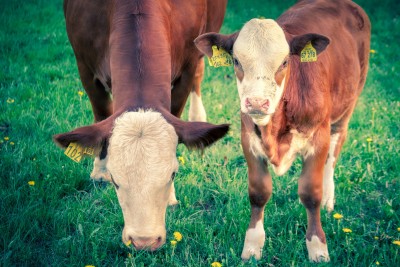Keeping the First Calf Heifers on Track by Parker Henley, OK State
Amy Barkley, Team Leader & Livestock Specialist
Southwest New York Dairy, Livestock and Field Crops Program

Keeping the First Calf Heifers on Track
Parker Henley, Oklahoma State University Extension Specialist
Heifer development is one of the most substantial expenses for beef cattle operations. Time quickly gets away when you're a cow-calf operator, but it's essential to keep the first calf heifers on track. Heifers conceiving early in their first breeding season will have increased lifetime production and efficiency. It is critical these heifers attain enough weight to initiate their first estrous cycle before the onset of the breeding season.
Recommendations for heifer development have been focused on heifers reaching a target body weight. It's suggested that heifers be developed to 65% of their mature body weight at the start of the breeding season. Many ranchers have not recently weighed the adult cows in their herd to know what average mature weight to expect. Therefore, most commercial ranchers underestimate the mature size and underestimate the target weights for the heifers. According to the American Angus Association, the average mature cow weight is 1200 pounds. Heifers from 1,200-pound mothers will need to weigh about 780 pounds by the start of the first breeding season. If the mature size of the herd is 1,100 pounds, then the heifers can be about 715 pounds when breeding begins. Only heifers with a potential mature size of 1,000 pounds can be expected to cycle at 650 pounds. These weights are not exact, since there is considerable variation within breeds, but the data shows large cattle must be fed for greater growth rates than smaller cattle. Since most replacements will need to gain 240 pounds between weaning and breeding, the heifers must gain around 1.5 pounds per day.
A major consideration is when to start the breeding season. Its common practice to breed heifers one month ahead of the mature cowherd. This may be a good idea if you do not have the available labor or facilities to calve both the mature cows and heifers at the same time. Also, this allows the two-year-old cow nursing their first calf to have an additional 30 days to begin cycling and breed back earlier in the next breeding season. If you choose to calve your heifers at 23 months of age instead of 24 months of age, make sure to increase the rate of gain so heifers reach 65% of mature body weight prior to breeding. This means that the spring cowherds starting their calving season in March should breed the replacement heifers around May 1st to calve in the first week of February.
Upcoming Events
Boots in the Barn: Cornell Dairy Research Updates
January 13, 2026
January 20, 2026
January 27, 2026
February 3, 2026
February 10, 2026
February 17, 2026
February 24, 2026
Join us for some or all!
Webinar: Converting Old Dairy Barns into swine Facilities
January 21, 2026 : Webinar: Converting Old Dairy Barns into swine Facilities
Tim Terry, Farm Strategic Planning Specialist with Cornell's Pro-Dairy program will share information on what it takes to transition an old dairy barn for swine production. We plan to cover flooring, ventilation, and lighting, considerations for system workability, and more! Registration is free.
Southern Tier Crop Congress
January 28, 2026 : Southern Tier Crop Congress
Belfast, NY
Join SWNYDLFC and CCE Allegany County for the upcoming Southern Tier Crop Congress. CCA and DEC credits are available!
Announcements
Cows, Crops & Critters Newsletter Sponsorship
TRYING TO REACH GROWERS AND AGRIBUSINESSES IN OUR SOUTHWEST REGION OF NEW YORK?Weekly Email Update: Shared with 625+ households who have signed up with our program.
Monthly Paper Mailer: To reach our stakeholders and farmers who lack internet access, we send out a monthly mailer where your company's logo and contact information would be featured with a mailing list of 330+ households.
If you sponsor our weekly and monthly publications you reach approximately 955 households.





